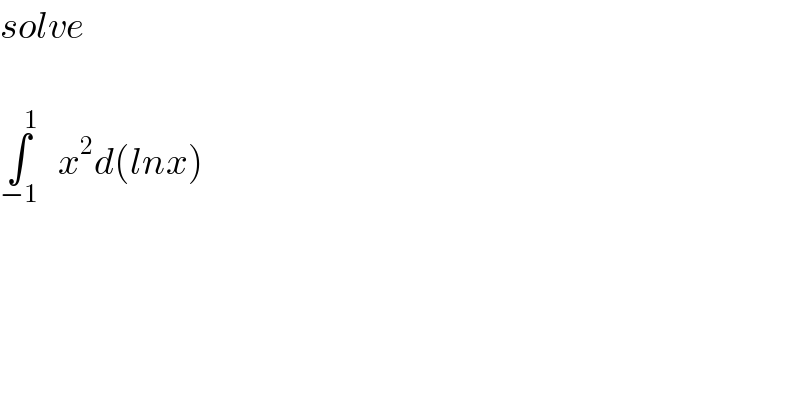
Question Number 23663 by Anoop kumar last updated on 03/Nov/17

$${solve} \\ $$$$ \\ $$$$\underset{−\mathrm{1}} {\int}^{\mathrm{1}_{} } {x}^{\mathrm{2}} {d}\left({lnx}\right) \\ $$$$ \\ $$$$ \\ $$$$ \\ $$
Commented by prakash jain last updated on 03/Nov/17

$$\mathrm{You}\:\mathrm{are}\:\mathrm{correct}.\:\mathrm{Thanks}. \\ $$
Commented by prakash jain last updated on 03/Nov/17

$$\mathrm{Does}\:\mathrm{the}\:\mathrm{integral}\:\mathrm{converge}? \\ $$$$\mathrm{ln}\:{x}\:\mathrm{for}\:{x}=−\mathrm{1}? \\ $$
Commented by $@ty@m last updated on 03/Nov/17

$${Here}\:\mathrm{ln}{x}=−\mathrm{1}\:\:{not}\:{x} \\ $$
Answered by $@ty@m last updated on 03/Nov/17
![Let ln x=t ⇒e^t =x ∫^1_ _(−1) x^2 d(lnx)=∫_(−1) ^1 e^(2t) dt =[(e^(2t) /2)]_(−1) ^1 =((e^2 −e^(−2) )/2)](Q23670.png)
$${Let}\:\mathrm{ln}\:{x}={t} \\ $$$$\Rightarrow{e}^{{t}} ={x} \\ $$$$\underset{−\mathrm{1}} {\int}^{\mathrm{1}_{} } {x}^{\mathrm{2}} {d}\left({lnx}\right)=\underset{−\mathrm{1}} {\overset{\mathrm{1}} {\int}}{e}^{\mathrm{2}{t}} {dt} \\ $$$$=\left[\frac{{e}^{\mathrm{2}{t}} }{\mathrm{2}}\underset{−\mathrm{1}} {\overset{\mathrm{1}} {\right]}} \\ $$$$=\frac{{e}^{\mathrm{2}} −{e}^{−\mathrm{2}} }{\mathrm{2}} \\ $$
